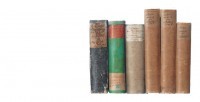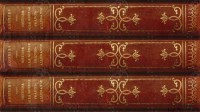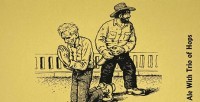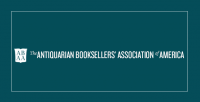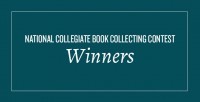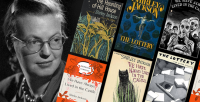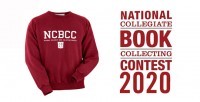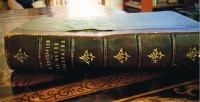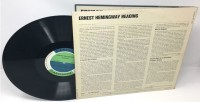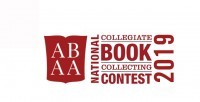Research documenting rare bindery dust jackets from the eighteenth to the twentieth centuries. Adapted from the Spring 2019 Journal of The Private Libraries Association, Pinner, Middlesex, England. Reprinted by permission. The practice of issuing dust jackets on new books is generally thought to have begun with the introduction of publishers' bindings around 1820. Books issued before then (and after) in provisional bindings are believed to have neither needed nor received jackets.1 But while this understanding of early jacket use has long seemed correct for British, American and European books, recently examined evidence shows that dust jackets were issued long before the 1820s in the German states and probably elsewhere in Europe. Most of the surviving examples of these jackets, including the earliest ones, are of German origin, which is where this previously undocumented and all but unknown chapter of book history begins. I. Two-piece bindery jackets 1760s–1860s Throughout the latter decades of the eighteenth century and beyond, German binderies produced a distinctive and durable type of dust jacket for the simple board bindings of that period. This practice continued well into the era of publishers' bindings in the nineteenth century. Examples of these jackets have been examined on about thirty titles, all bound in paper-covered boards, from the 1760s to the 1860s.2 These early jackets had several characteristics that were common to them throughout the entire period of t... [more Early Bindery Dust Jackets]
Et Cetera
The Kenneth W. Rendell Collection on the Detection of Forged Handwriting Donated to the Grolier Club. The Grolier Club Library is pleased to announce the receipt of a major gift, the Collection on the Detection of Forged Handwriting, which is the most important and comprehensive collection on the subject known to exist anywhere. The gift is from club members Kenneth W. Rendell and Shirley McNerney. Rendell, a leading dealer in historical letters and documents, has exposed numerous famous forgeries such as the Hitler Diaries fraud, Mussolini's diaries, the Mormon forgeries and murders, and Jack the Ripper's forged diary. This collection was formed over a 60-year period and consists of thousands of forgeries, facsimiles of handwriting, reference books, and archival files concerning major cases in which Rendell has been involved. The collection is wide-ranging, encompassing historical letters and manuscripts from the early 17th century to the modern day. Classic forgeries of Shakespeare, Robert Burns, Schiller, Washington, Lincoln, Franklin, Berlioz, Wagner, Poe and numerous others are included. Rendell made every effort over his long and distinguished career to acquire original examples of past forgers from many sources, including the files of dealers such as Charles Hamilton, Mary Benjamin and Goodspeeds. The gathering together of so many “original” forgeries – often destroyed and notoriously difficult to collect – alongside genuine examples of handwriting and a specia... [more Kenneth W. Rendell Collection on the Detection of Forged Handwriting]
ABAA-member Ken Sanders, owner of Ken Sanders Rare Books in Salt Lake City, has announced an exciting new tactic in the battle to keep his famous bookstore afloat. After offering "investment" gift certificates during the early days of the pandemic, and then launching a successful GoFundMe campaign, Sanders has now partnered with a local brewery to create small-batch beers in commemorative cans celebrating the characters of Edward Abbey's famous novel The Monkey Wrench Gang featuring artwork by the noted cartoonist R. Crumb. Sanders credits Colby Frazier, one of the owners of Fisher Brewery, for "proposing the idea as a fundraiser for KSRB." Salt Lake City's Fisher Beer are crafting six different small-batch brews and have been releasing one approximately every two weeks since the end of November. The batches have been selling out quickly, as this podcast report from Roger McDonough of KCPW.org reports. Edward Abbey fans outside Utah who want to get hold of these commemorative cans will have to settle for a set of empties, as Utah law prevents beer from being shipped out of the state. Commemorative six packs containing each of the cans can be ordered from the brewery for delivery after the final batch is released. Ken Sanders is also currently making a few individual empty cans and a commemorative poster available on abaa.org -- while stocks last! Sanders originally commissioned R. Crumb to create the artwork for a calender project to celebrate the 10th anniversary of The Monk... [more Ken Sanders’ Collectible Beer Cans]
The Antiquarian Booksellers' Benevolent Fund Since its founding in 1952 by a group of ABAA members, the Antiquarian Booksellers' Benevolent Fund has been dedicated throughout its history to providing timely financial assistance to those in the book trade who find themselves in a time of need. Originally known as The Charles Grand Memorial Fund (a founder's reminiscence can be found below), it was specifically meant to provide “for the assistance of needy persons, regardless of affiliation, who are or have been engaged in the business of selling and dealing in books, manuscripts, and printed matter in general,” with the only proviso being that funds may be granted only for personal needs, not for business needs. In a typical year, the Fund gives a total of $40,000 in one-time disbursements to booksellers in need, the majority of whom are not members of the ABAA. Historically, the Fund has been sustained by donations from ABAA members, their generosity born out of their understanding of how precarious a livelihood in the book trade can sometimes be. Most antiquarian booksellers are individual proprietors with limited capital, and are especially vulnerable to unanticipated ill-health, accidents, natural disasters or other types of misfortune. The Antiquarian Booksellers' Benevolent Fund is administered by a group of Trustees comprised of the three most recent Presidents of the ABAA. The ABAA regards its stewardship of the Benevolent Fund as one of its most important responsi... [more Donate to the Benevolent and Woodburn Funds]
The winners of the 2020 National Collegiate Book Collecting Contest have been chosen. They are: First: Alan Tu, Harvard University: "Found in Translation: Contemporary World Fiction Revisited." (download Alan's entry) Second: Jack Swab, University of Kentucky: "Gay Spaces: Travel Guides and Maps for the LGBTQ Community, 1969-2001." (download Jack's entry) Third: Brendan W. Clark, Trinity College: "The Baron Colchester: Recreating the Library of a 19th Century English Parliamentarian and Country Gentleman in Substance and Subject." (download Brendan's entry) Essay: Matthew O. Weinstock, Washington University in St. Louis: "Party-Bottom Paperbacks: Cruising Bookstores in Search of Queer History." (download Matthew's entry) The National Collegiate Book Collecting Contest is jointly administered by the Antiquarian Booksellers' Association of America (ABAA), the Fellowship of American Bibliophilic Societies (FABS), the Grolier Club, and the Center for the Book and the Rare Books and Special Collections Division (the Library of Congress) Congratulations to all the winners of the 2020 National Collegiate Book Collecting Competition! Meet the 2019 NCBCC winners... Meet the 2018 NCBCC winners... [more 2020 NCBCC Winners]
For those of you unfamiliar with Shirley Jackson's work, consider yourself warned of potential SPOILERS right now and exit out of this page. Preferably to pick up one of her books and see for yourself. I still remember the first Shirley Jackson piece I ever read. Like most American high-school teenagers, it was one of her short stories. A terrifying and eye-opening piece entitled The Lottery. To this day, I think it is one of the most horrifying works I've ever read (and this coming from an avid Agatha Christie fan). A work that reveals a callous and mindless side of human nature – just following the herd mentality, even if it involves killing your own mother – what wouldn't be creepy about that? The Lottery has always stuck with me, and also have the other stories by Jackson that I have read since. We Have Always Lived in the Castle is a fan favorite for a reason! So here's to the real question… what had this seemingly average American housewife done to become the architect of such frightening tales? Well… let's take a look! The Lottery New York: Farrar, Straus and Company, 1949. First Edition. Hardcover. Very Good/Good+. First edition. (First state with the "fs" logo on the copyright page. Jacket has correct first issue price of $2.75 and correct back panel and flap info: "Farrar, Straus Company/ 53 East 34th Street, New York 16, N. Y.") 306 p. Very Good in Good+ dust jacket. Offsetting to end papers, cloth is bit grubby, worn at tips. Jacket has some chips missing... [more Mistress of Terror: Shirley Jackson]
The ABAA is accepting entries for the 2020 National Collegiate Book Collecting Contest, which is jointly administered by the Antiquarian Booksellers' Association of America (ABAA), the Fellowship of American Bibliophilic Societies (FABS), the Grolier Club, and the Center for the Book and the Rare Books and Special Collections Division of the Library of Congress. The National Collegiate Book Collecting Contest is open to all prizewinners of college book-collecting contests, whether or not first prize, as well as to interested students whose institutions do not offer formal contests or whose contests may have been canceled this year. (More information can be found here.) All entries should be submitted at apply.abaa.org. All entries for the 2020 competition must be submitted by June 16, 2020. For more information on the contest, please visit contest.abaa.org. Meet the 2019 NCBCC winners... Don't miss any articles on The New Antiquarian blog! Subscribe to the ABAA email newsletter! * indicates required Email Address * Email Format html text #mc_embed_signup{background:#fff; clear:left; font:14px Helvetica,Arial,sans-serif; width:420px;} /* Add your own MailChimp form style overrides in your site stylesheet or in this style block. We recommend moving this block and the preceding CSS link to the HEAD of your HTML file. */ [more 2020 National Collegiate Book Collecting Contest]
The 2020 winner of the prize is Nolin Deloison Baum of Oakland, California. His collection of culinary high spots is centered around Georges Auguste Escoffier. “I have collected books since I learned to read. After getting my BA, I went to culinary school in Paris and eventually became a professional cook. Fluent in French, it was natural that I also study, and, of course, collect, the historical texts that were significant of my profession,” the 30-year-old Baum said in his winning statement Sponsored by the Southern and Northern California Chapters of the Antiquarian Booksellers' Association of America, The California Young Book Collector's Prize is open to collectors aged 35 and under who are living in California. All collections of books, manuscripts, and ephemera are welcome, no matter their monetary value or subject. Among the prized books in his collection is Le Guide Culinaire, Aide-Mémoire de Cuisine Pratique Bibliothèque Professionnel (1903). Escoffier inscribed this first edition of Le Guide Culinaire to his co-author, “To my very dear friend and devoted collaborator E. Fétu. In recognition of my eternal gratitude.” It is also inscribed by the other primary collaborator in this book's creation, Phileas Gilbert. Baum says that thanks to his œuvre, Escoffier was known as “the king of cooks and the cook of kings,” but without Émile Fétu's tireless editing and recipe-testing, this masterpiece might never have been. It is the single most influential to... [more 2nd Annual California Young Book Collector’s Prize Awarded]
One of the more remarkable comeback stories of the 21st century has been the rebirth of the vinyl record. Once the most-common form for sales of popular music, the vinyl record was consigned to the dustbin of history by the late 1980s thanks to the rapid adoption of new formats (first 8-tracks, then cassettes, and finally CDs), along with the accompanying miniaturization of the playback machines themselves. As consumers, the mass market embraced smaller, more-portable formats, and vinyl records and the necessary cumbersome equipment to play them were judged obsolete. However, the emerging digital technology that made our smart phones and streaming services possible were based on compromises in sound quality that many aficionados could not accept, so vinyl records never truly went away, even as decades passed without most chart-topping music recordings being made available on vinyl. Speciality vinyl stores endured! Collectors and die-hard fans ensured that interest remained passionate, and have enjoyed building up their own record libraries as people without record players dispose of their parents often vast album collections. In recent years, micro-presses have been established all over the world, and for many bands, vinyl versions of their albums have become premium products, produced in limited editions and often selling out swiftly. Major retailers are again stocking vinyl albums, and records can be purchased at most malls in the US. Picture discs, colored vinyl, and other... [more Vinyl Records: Collectable & Cool]
The winners of the 2019 National Collegiate Book Collecting Contest have been chosen. They are: First: Matthew Wills, University of California, San Diego: "The Largesse of the Propaganda State: Printing Anti-Confucian Vitriol in Mao's China." Second: Miriam-Helene Rudd, University of Delaware: "20th Century Mystery Adventure Series for Young Women." Third: Michael Dascal, University of Maryland: "Scientific Revolutions: Crises and Paradigm Shifts in the History of 20th Century Western Scientific Thought." The winners' collections ran the gamut from popular novels (Miriam Helene-Rudd asked "Is Nancy Drew dated or daring?") to the great scientific paradigm shifts of the twentieth century (which Michael Dascal defines as "the development of relativity theory and quantum mechanics"), and also explores "a modern state's power to commandeer vast quantities of paper and ink for its nefarious political ends" (in Matthew Wills' words). The winners demonstrate that this young generation of book collectors embrace a broad and diverse array of interests. The National Collegiate Book Collecting Contest is jointly administered by the Antiquarian Booksellers' Association of America (ABAA), the Fellowship of American Bibliophilic Societies (FABS), the Grolier Club, and the Center for the Book and the Rare Books and Special Collections Division (the Library of Congress), with major and exclusive support for the Kislak Prize from the Jay I. Kislak Foundation. The award ceremony will take place... [more 2019 NCBCC Winners]


